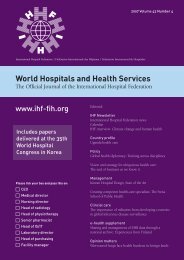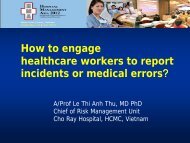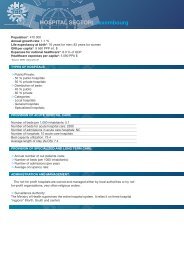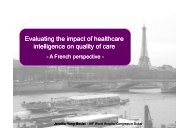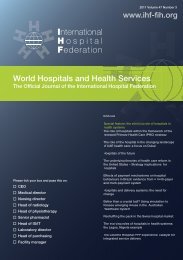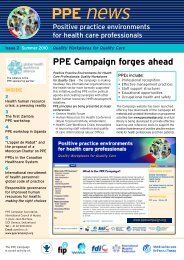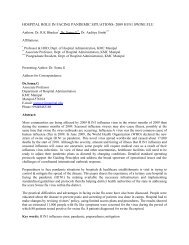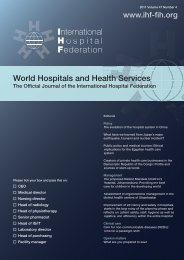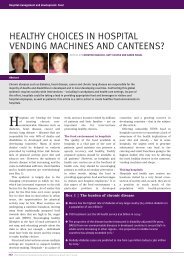World Hospitals and Health Services - International Hospital ...
World Hospitals and Health Services - International Hospital ...
World Hospitals and Health Services - International Hospital ...
Create successful ePaper yourself
Turn your PDF publications into a flip-book with our unique Google optimized e-Paper software.
E-HEALTH SUPPLEMENT: WORLD HEALTH CHANNEL<br />
The <strong>World</strong> <strong>Health</strong> Channel:<br />
an innovation for health <strong>and</strong><br />
development<br />
DR HARRY MCCONNELL<br />
DIRECTOR, INSTITUTE FOR SUSTAINABLE HEALTH EDUCATION AND DEVELOPMENT<br />
DR TENAGNE HAILE-MARIAM<br />
ASSISTANT PROFESSOR, ASSOCIATE DIRECTOR OF INTERNATIONAL PROGRAMS, GEORGE WASHINGTON UNIVERSITY<br />
MEDICAL CENTER AND THE RONALD REAGAN INSTITUTE OF EMERGENCY MEDICINE<br />
DR S RANGARAJAN<br />
SENIOR VICE PRESIDENT, NEW APPLICATIONS AND SERVICES, WORLDSPACE CORPORATION<br />
Abstract<br />
The issues of the digital divide <strong>and</strong> of accessing health information in areas of greatest need has been addressed by<br />
many. It has been a key component of the discussion of the <strong>World</strong> Summit for the Information Society <strong>and</strong> also the<br />
focus of an important new initiative, the Global Review for <strong>Health</strong> Information. Only approximately 1 in 700 people in<br />
Africa have internet access compared to a rate worldwide of approximately 10%. Access to essential health<br />
information <strong>and</strong> knowledge management for health care has been deemed a priority for the development of health<br />
systems <strong>and</strong> for the care of patients in areas with limited resources, prompting recent efforts by international<br />
organisations <strong>and</strong> by both governmental <strong>and</strong> non-governmental agencies (see Godlee et al, 2004 <strong>and</strong> McConnell,<br />
2004).<br />
<strong>Health</strong> care in developing countries can be limited by many different resources: lack of health care workers with<br />
sufficient training, lack of diagnostic equipment, lack of treatment facilities or essential pharmaceuticals; <strong>and</strong> lack<br />
of education or expertise in many relevant areas. Much of the health care done in developing countries is by local lay<br />
persons or practitioners or by volunteers working with a variety of NGOs. These volunteers are often very dedicated<br />
young people with a vision of health-for-all that is often frustrated in the limited time they are able to spend in these<br />
areas <strong>and</strong> further constrained by meager resources (including availability of appropriate information). The<br />
availability of medical expertise <strong>and</strong> consultation depends largely on the geographical location of the health<br />
practitioner <strong>and</strong> of the patient as well as the level of integration with local practitioners <strong>and</strong> extent of outside agency<br />
involvement. Furthermore, there are often many NGOs working simultaneously on similar projects in the same<br />
region without knowledge of each other’s activities. Often this occurs simply because a lack of communication exists<br />
between organisations, resulting in unnecessary duplication of effort.<br />
The availability of medical expertise <strong>and</strong> consultation depends largely on the geographical location of the health<br />
practitioner <strong>and</strong> of the patient as well as the level of integration with local practitioners <strong>and</strong> extent of outside agency<br />
involvement. The health care worker in developing countries is frequently faced with a paucity of information<br />
appropriate to the clinical situations on h<strong>and</strong> as well as a lack of locally available expertise. The lack of access to<br />
health care <strong>and</strong> other vital resources is one factor in the much lower (by approximately 1/3) life expectancy in the<br />
least developed countries compared to industrialised nations. In many developing countries there is only one doctor<br />
for 5-10,000 people, compared to a ratio of 1:200 in many developed countries. Textbooks, if they exist, may be 10-20<br />
years out of date <strong>and</strong> are often directed more at the needs of developed countries.<br />
There is thus a growing need for wider availability of training <strong>and</strong> information on health care in developing<br />
countries <strong>and</strong> support for health care workers. There is also a need for increased communication <strong>and</strong> collaboration<br />
between governmental <strong>and</strong> non-governmental organisations working in international health to share education,<br />
resources <strong>and</strong> to coordinate efforts in areas supporting improved health care delivery.<br />
In recognition of this, the Institute for Sustainable <strong>Health</strong> Education <strong>and</strong> Development (www.ished.org) is<br />
launching the <strong>World</strong> <strong>Health</strong> Channel (WHC) in the spring of 2005 in collaboration with <strong>World</strong>Space. This will allow<br />
access to critical health information in developing countries <strong>and</strong> place the emphasis on issues important for clinical<br />
care for front line health workers in these areas.<br />
36 | <strong>World</strong> <strong><strong>Hospital</strong>s</strong> <strong>and</strong> <strong>Health</strong> <strong>Services</strong> | Vol. 40 No. 4



